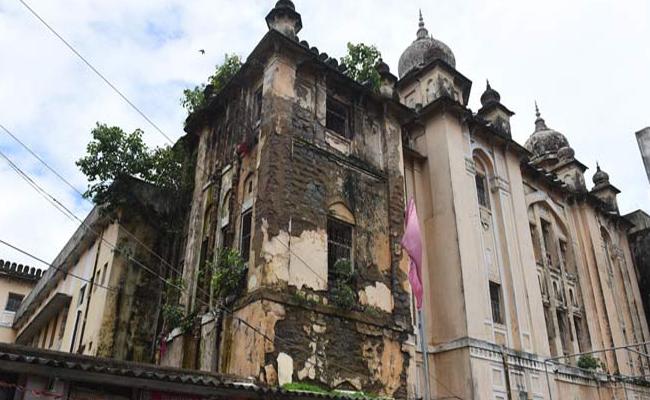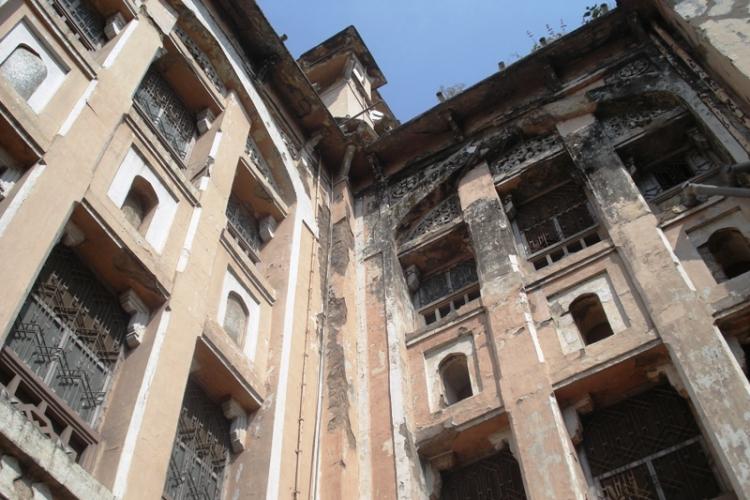The new construction of the old heritage building is surrounded with plans and politics. A new conspiracy surfaced recently. The Hyderabad MP and AIMIM supremo Asaduddin Owaisi said that he has no love the historical main building, indirectly gunning for it to be torn down.

Recently, the dipremo of All India Majilis-e-Ittehadul (AIMIM) and MP Asaduddin Owaisi drew the ire of heritage activists once again when he said that he has no love for the historical building of Osmania General Hospital (OGH). Many have taken that statement of his to believe that it is more or less a call to demolish the structure, which is a protected heritage site.
It was the second time that Owaisi made a statement about Osmania Hospital in recent times. Earlier, he called on the Telangana government to keep or demolish the old building, but asked it to construct a new modern structure. Back then too many citizens were unhappy that the Hyderabad Lok Sabha MP did not speak up to save the heritage site. This time however, he indirectly called for it to be pulled down.
As of now, the Telangana High Court is hearing a case with regard to Osmania Hospital’s fate, as the state government had planned to demolish the structure, which is part of Hyderabad’s modern buildings built during the time of the city’s last Nizam, Mir Osman Ali Khan (1911-48). It may be noted that the structure is also a listed and protected under the Hyderabad Metropolitan Development Authority’s laws. Owaisi calling for it to be razed, in fact is unlawful.
Why demolition cause more harm than good?

But the question about the issue is this: Do we really need to raze down the heritage site to have a new building for Osmania General Hospital?
The Osmania Hospital campus is huge, and currently has two other blocks from which all the departments are functioning. The main or the old building has been shut since July 2020 after rain water flooded the ground floor, after which calls for its demolition grew (however it was later found that a choked drain in the premises was the culprit, and not the rain).
More importantly, those who are calling for the old building to be demolished and for a new one to be built, also forget the fact that thousands or lakhs of people, mostly the poor people visit this hospital on daily basis. Plus, constructing a new building means shutting down operations and large scale disturbances in the hospital’s daily functioning.
According to a senior official from Osmania Hospital, about 2000 to 2500 patients are admitted in the Outpatient Section (OP) every day. Aside from that, there are about 200 to 250 daily admissions, and about 150 to 200 operations as well on a daily basis. “Several people from the districts even outside the state come. Shutting down the old building has not reduced numbers at all,” he told #KhabarLive.
In total, Osmania General Hospital has 23 departments under it, excluding those working out of other medical colleges. At present, patients have all been transferred to the OP and Quli Qutb Shah buildings in the Osmania Hospital premises. The main building, which requires repairs or restoration, will have its fate decided by the High Court soon.
A heritage activist from the city, who did not want to be named, asked why Owaisi has been gunning for the main building of Osmania Hospital to be demolished off-late. “It is unethical on his part. OGH is considered to be part of Hyderabad’s heritage due to its medical history. Moreover, they (Owaisi family) also run hospitals, so if OGH is shut due to reconstruction, many in the Old City will be forced to go to private hospitals like his,” he remarked.
History of Osmania General Hospital

OGH was completed in 1925, after Hyderabad was affected by the bubonic plague around 1911. The city administration then took care of the issue, following which the then Nizam Osman Ali Khan (1911-48) set up the City Improvement Board (CIB) in 1912 to improve Hyderabad’s infrastructure. It was designed by architect Vincent Esch, who also designed the Victoria Memorial in Kolkata.
The OGH’s old building (along with others like High Court and City College) is a fine example of the Osmanian style or Indo-Saracenic genre of architecture and is an integral part of Hyderabad’s 20th century riverscape and skyline. The CIB during the reign of Osman Ali Khan had transformed the medieval city into a modern metropolis, complete with infrastructure like the High Court, railway stations, schools and OGH.
Lack of restoration over the years
In a 2013 report, a new building block was suggested to be built for Rs. 100 crore and restoration of the old structure was suggested for Rs.19 crore then. The new building was to have many other facilities, which were being run from other buildings. However, after Telangana was formed in 2014, Chief Minister K. Chandrasekhar Rao visited OGH in 2015, which was followed by an announcement of OGH’s demolition.

The announcement of the demolition of OGH led to a public outcry, following which an expert team from the Indian National Trust for Art, Culture, and Heritage (INTACH) submitted after a structural, stability and safety study.
It summarized that the conservation of the in-patient block or the old heritage building should be restored based on heritage conservation principles. In 2019, state officials along with architects from the Aga Khan Trust for Culture (AKTC) also inspected OGH to look at restoration. But that also fell through. #KhabarLive #hydnews
